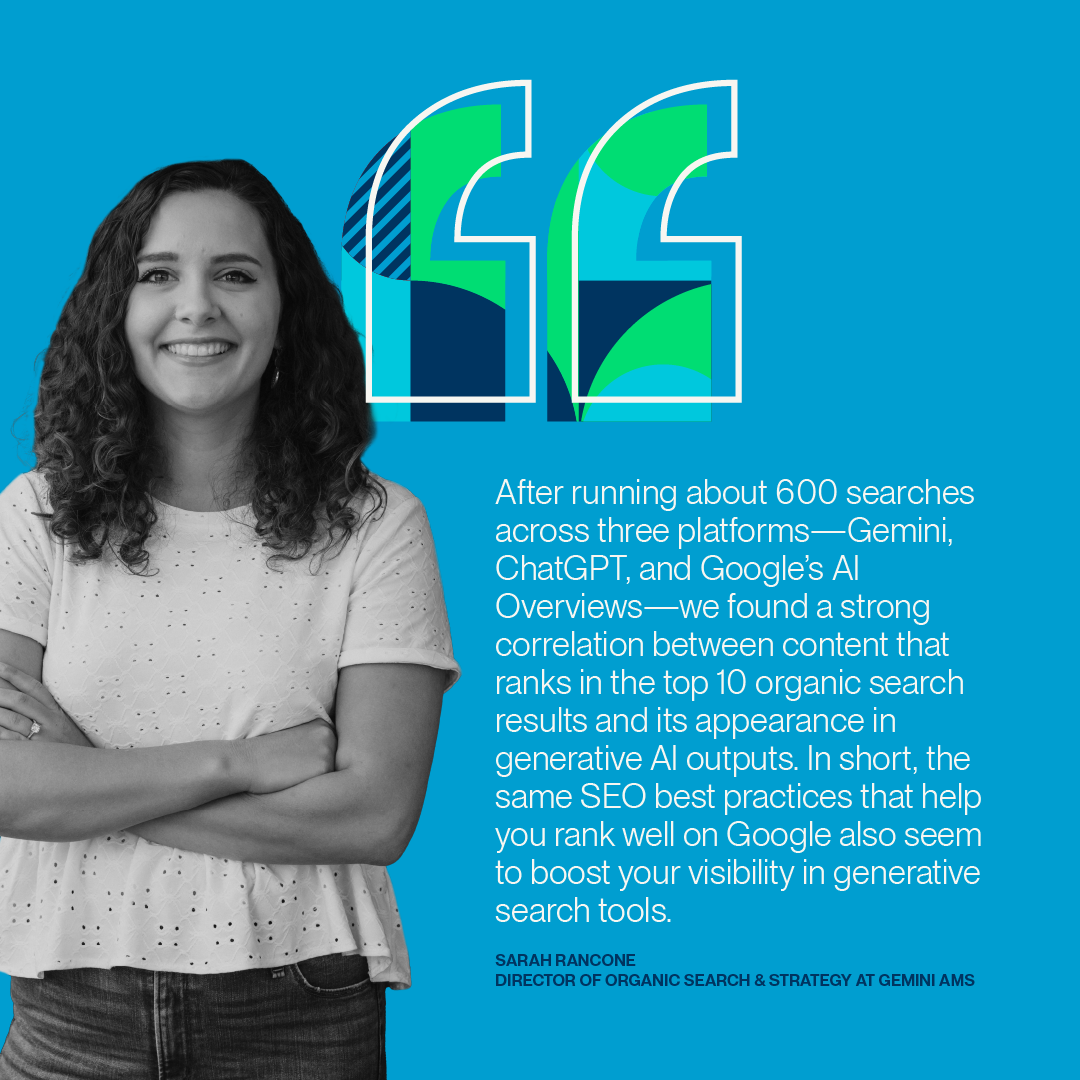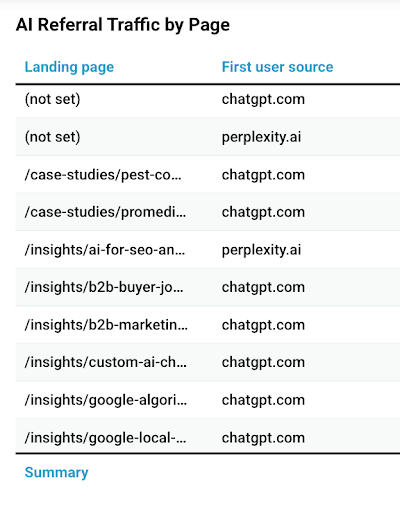The Impact of AI Generative Engines on SEO in 2025
May 2025
The rise of AI-powered generative engines has created a seismic shift in how users search for information. In turn, this has changed how businesses need to approach their SEO and content strategies to remain competitive.
That’s why the SEO, content, and AI experts at Gemini AMS have spent the last two years researching the impact of AI on SEO. Our goal: ensure our clients thrive in the not-so-distant future of digital marketing.


The rise of AI-powered generative engines has created a seismic shift in how users search for information. In turn, this has changed how businesses need to approach their SEO and content strategies to remain competitive.
That’s why the SEO, content, and AI experts at Gemini AMS have spent the last two years researching the impact of AI on SEO. Our goal: ensure our clients thrive in the not-so-distant future of digital marketing.
What Are Generative Engines?
Generative engines refer to AI models like OpenAI’s GPT-4 or Google’s Gemini. These tools go beyond retrieving information by generating original responses based on vast data sets and user intent. Instead of producing a list of links like a traditional search engine, generative engines deliver answers in a conversational format.
How Do Generative Engines Impact SEO?
Don’t Just Rank—Resonate
Rather than optimizing solely for Google’s algorithm, marketers must now consider how their content is interpreted and recommended by generative engines. This means factoring in how AI summarizes, cites, and synthesizes content from across the web.


Tried & True:
The More Things Change, The More They Stay the Same
Our internal research shows considerable overlap between what performs well in traditional rankings and what gets surfaced in AI-generated results. For example, blog content that earns Featured Snippets, or other rich results, frequently appears in generative engine outputs across platforms. Key factors like topical authority, clarity, and comprehensive coverage influence visibility across both environments.
The Art & Science of Quality Content Remains Vital
If we had a dollar for every time an algorithm update or an industry shift re-demonstrated the importance of quality content, we’d be headed straight for the bank. One of the biggest takeaways from our research is that quality content remains the backbone of SEO success. Whether you’re optimizing for traditional search engines or emerging generative platforms, original, unique, and helpful content remains imperative.
If Anyone Can Create Content. What Makes it Quality Content?
The term “quality content” is thrown around like a baseball. But how do you get a home run, particularly in 2025? Across both traditional SEO and AI tools, content that aligns with user intent, offers depth and clarity, and demonstrates expertise consistently outperforms thin or generic alternatives.
Three major qualities that contribute to strong performance include:
- Authority
- Accuracy
- Originality
These are especially important as AI engines prioritize trustworthy sources for citations and answers. In short, content that earns visibility across platforms is content that helps people solve real-world problems.

Put It Into Practice:
Quick-Hit Tips for Creating Quality Content
- Perform original research
- Ensure your content is typo- and error-free
- Get quotes and information from subject matter experts
- Incorporate relevant and high-ranking keywords
- Integrate branded and custom images like infographics
- Don’t rely on tools like ChatGPT for complete content creation. Instead, use them for outlines, topic ideation, and editing.
Are There Similarities Between Traditional SEO & Generative SEO?
Yes! The foundational principles of SEO aren’t dead and gone—they’ve actually expanded. Whether it’s a Google crawler or a generative AI tool, the objective is the same: deliver the most useful and authoritative content to users. However, the mechanics behind content’s visibility, especially in how machines interpret your content, still rely heavily on traditional SEO best practices.
- Schema Markup (Structured Data): Schema helps both search engines and AI tools understand context. Whether it’s identifying your content as a product, FAQ, service, or article, structured data increases the chances of your content being featured in rich results and pulled into AI summaries. Generative engines rely on this clarity to cite accurate and relevant information.
- Metadata Optimization: Meta titles and meta descriptions not only influence click-through rates in SERPs, but they also serve as concise summaries for AI models. Optimized metadata signals topical relevance, increases user engagement, and even shapes how your site is referenced in AI-generated responses.
- Site Structure & Internal Linking: Clean architecture allows crawlers and AI models to easily navigate and comprehend your site. Clear internal linking supports topical clusters, improves content discoverability, and reinforces authority.
- Page Speed & Mobile Optimization: Fast, mobile-friendly experiences still matter. AI might summarize your content, but users will click through when they want depth. Poor performance hurts user experience, which impacts both traditional rankings and AI-based referrals.
- Alt Text & Media Optimization: Descriptive alt text and media labeling help engines parse visual content. AI tools trained on multimodal data are increasingly factoring in image and video relevance—making media optimization even more critical for 2025 SEO strategies.
The Proof is in the Dashboard:
How We Integrate AI Referral Traffic into Custom Reporting for Our Clients
As generative engines have matured, they’ve started driving a new form of traffic: AI referral traffic. This includes visits that originate from users interacting with AI tools that cite a website.
At Gemini AMS, we’ve developed custom dashboards that integrate AI traffic data alongside traditional SEO metrics.
This offers our clients a fuller picture of where visibility and engagement are coming from, allowing them to uncover growth opportunities and refine their content strategy.

Ongoing Monitoring: Keeping an Eye on Client Presence in Generative Engines
In an AI-powered search environment, visibility isn’t static—it’s dynamic and evolving. That’s why ongoing monitoring is key. We continuously track how our clients are being surfaced in generative engines, from GPT-based tools to Google’s AI overviews. Our approach blends technical SEO, content analysis, and real-time alerts to ensure businesses stay discoverable as algorithms shift.
For home service businesses, B2B firms, healthcare providers, and more, staying top-of-mind in generative search is no longer optional—it’s essential.
The Continued Evolution of Content, SEO, & AI
Looking ahead, we expect AI to drive even deeper personalization in search by combining real-time intent signals with conversational capabilities to deliver hyper-relevant answers. For businesses, this means adapting faster, thinking more holistically about user experience, and embracing AI-driven SEO strategies that leave keyword stuffing and traditional ranking hacks behind.
At the same time, content remains a steady constant. AI will amplify what’s already working, making high-quality, expert-level content more valuable than ever. Quality will trump quantity every time.
Navigate the New Search Landscape With a Trusted Partner
In 2025, the intersection of AI and SEO is the new normal. At Gemini, we’re passionate about helping businesses navigate this shift by integrating generative AI insights into scalable SEO and content strategies. Want to future-proof your digital marketing? Contact our team to learn how AI-powered SEO can elevate your brand’s visibility.
Blog Written by Senior Content Manager, Malena Larsen
Insights Provided by Director of Organic Search & Strategy, Sarah Rancone
Join the gemini newsletter
Stay up to date on all the latest news ranging from our industry to our agency!


